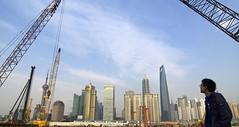
China has become an economic powerhouse in Asia and throughout the world. The nation's stimulus package far outstrips the US. The socialist nation places people before banks.
Originally uploaded by Pan-African News Wire File Photos
19:04 Mecca time, 16:04 GMT
China 'recovers' from global slump
China has declared itself the first major economy to recover from the global economic downturn as data showed economic growth accelerated to 10.7 per cent in the final quarter of 2009.
GDP for the whole year totalled 8.7 per cent according to government figures released on Thursday, easily beating targets.
However, the raft of data released by the National Bureau of Statistics also showed inflation picking up, adding to pressure on the government to prevent overheating in the economy.
"China has become the first, on the whole, to achieve recovery and stabilisation in its economy," Ma Jiantang, the bureau's commissioner, told reporters in Beijing.
But he added that in the face of ongoing "uncertainties" and a weak global outlook, the government would avoid major changes in economic policy.
The figures put China's total gross domestic output for 2009 at $4.9 trillion, bringing it closer to overtaking Japan as the world's number two economy after the US.
'Developing country'
Nonetheless, Ma stressed that China sees itself as a developing country with a wide income disparity between its urban and rural populations.
Average income for city dwellers in 2009 was $2,700, he said, while in the populous countryside it was just $752.
"Despite the increase in our GDP and economic strength, we still have to recognise that China is a developing country," Ma told a news conference. "We have to be keenly aware of that."
China's leaders have said stimulus spending will continue but are worried about rising prices and have ordered banks to curb lending after a record surge in 2009.
According to Thursday's figures, consumer prices picked up in the fourth quarter of 2009 after falling for much of the year.
Prices rose 0.6 per cent in November from a year earlier and spiked by 1.9 per cent in December.
"That's a huge jump," Ken Peng, an economist with Citigroup, told the Associated Press.
He said it was the sharpest one-month rise in inflation since February 2008, when China was suffering record consumer price hikes.
Peng said the data showed it was time for the government to call a halt to stimulus measures.
Inflation
The spectre of inflation is especially politically sensitive in China, because rising prices erode the economic gains that the ruling Communist party has made the basis of its claim to power.
But Tom Orlik, a Beijing-based economist for Stone & McCarthy Research Associates, said the problem for the government will be to "manage the withdrawal of the stimulus without scaring the markets or pulling the rug out from under the recovery."
"Turning the taps off might be a bigger challenge than turning them on," he wrote in a report.
In the past year China adopted what it called a "moderately loose" monetary policy and embarked on an unprecedented four-trillion-yuan ($586bn) spending spree to keep the economy growing amid the global downturn.
In recent months however the government reversed course and called for "reasonable" lending as inflation fears rose, following a surge in the amount of new loans.
On Wednesday the country's top banking regulator said the government will closely monitor credit.
Liu Mingkang, the chairman of the China Banking Regulatory Commission, said China will rein in credit after last year's explosive growth but had no plans to stop banks lending.
Bubble worries
China's biggest rise in inflation in 13 months underlined the broader challenges of breakneck growth, and came as the World Bank warned anew that the country could face an economic bubble.
In the Global Economic Prospects 2010 report published on Wednesday the World Bank said it sees "signs of bubbles" in the Chinese economy, a problem it said the government has acknowledged.
The annual report said the Chinese economy is projected to continue to lead global growth this year, expanding at a pace of 9.0 per cent, dwarfing the global rate of 2.7 per cent.
"We can already see some signs of bubbles and signs of tensions in the Chinese economy, in particular in the housing sector," Andrew Burns, the lead author, said in Washington ahead of the report's release.
Burns, who is the head of the bank's macroeconomic forecasting, said China's "low domestic interest rate and the "particular nature" of its fiscal stimulus was "putting strains on the economy and forcing the government to step back".
Michael Pettis, a finance professor from Peking University, told Al Jazeera the stimulus to boost investments may lead to China seeing increased debt and rising non-performing loans in its banking system because not all investments were viable or sustainable.
Referring to reports of bubbles in the stock market or real estate, Pettis said the wealth impact in the case of a collapse in either sector "will be less than what people think because most Chinese save in bank deposits".
A much bigger worry is if a collapse in real estate prices leads to non-performing loans in the banking system, he said.
"The real risk is not a bubble in the stock market or in the real estate market," he added.
"The real risk is that we're continuing to increase capacity in a world in which demand is contracting… there is no need for all this increase in capacity."
Source: Al Jazeera and agencies
No comments:
Post a Comment